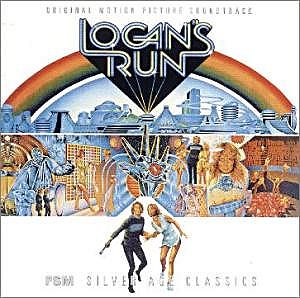Jerry GOLDSMITH
Info@filmscoremonthly.com
Logan's Run
OST
FILM SCORE MONTHLY Vol. 5 No. 2 [74:18]
Available from Film Score Monthly, 8503 Washington Boulevard, Culver City, CA90232; Tel: 1-888-345-6335; overseas: 310-253-9595; fax: 310-253-9588; email:Info@filmscoremonthly.com

There's just one catch. No-one is permitted to live beyond the age of thirty! This is the basic premise behind this sturdy, innovative Jerry Goldsmith sci-fi score from the mid seventies. And even if the film itself was a little stolid, the music certainly isn't.
A simple, ominous three note ascending motif is the first key theme to appear on 'The Dome/The City/Nursery' and the early part of the score is dominated by a variety of bleak electronic cues like 'Flameout' and 'Fatal Games', along with some icy string pieces such as the unsettling 'She'll Do It/Let Me Help'. Another notable track, 'A Little Muscle', has a slight similarity to the composer's work on the 'Nightmare at 20,000 Feet' segment of Twilight Zone: The Movie. Better still is 'The Sun', the first cue to utilise full orchestra and this is where Goldsmith introduces his 'love theme' (despite earlier subtle hints at it) and this motif is further developed in the eight minute plus 'The Monument' with a brief flute led, refined version before a richer, full orchestral reprise. This long cue also includes some variations on the main 'City' theme which illustrates the strong thematic structure of Goldsmith's work. Another imposing piece is 'You're Renewed', a boisterous action cue with brash brass and typically skittish piano and strings. Finally 'End of the City' concludes with the 'love theme', first gently for strings then in full orchestral mode to climax. As a fun bonus there is also 'Love Theme From "Logan's Run"', a pseudo pop interpretation arranged by Jimmie Haskell.
Although the electronics used to depict life in the emotionally sterile 'City' are somewhat dated, there is no questioning their effectiveness and ironically it now seems to enhance the futuristic quality of the film itself. Of course, much of this synthesizer work is by its very nature not particularly melodic and doesn't make for easy listening. However, full orchestra comes into play once the protagonists discover there is another world beyond.
Another worthy release from Film Score Monthly that not only Goldsmith admirers but general film music fans will grab with both hands. Technically and creatively this is a fine score, although its merits and attraction rely on an appreciation of film music beyond merely the melodic.
Mark Hockley

Return to Index